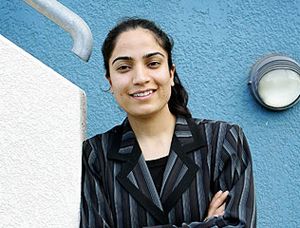Anthony Loyd in Kabul
The rendezvous is clandestine. A voice on the telephone instructs us to drive to a point beside a dusty highway cutting though the suburbs of Kabul.
A dark-blue, four-wheel drive pulls up. Inside, a young gunman checks our identities before ordering us to follow. We drive through alleyways and stop beside the high gates of an anonymous compound.
Another gunman stands inside. He searches us before allowing us to climb a stairwell. At the top we enter an empty room. The secrecy and subterfuge suggest that an insurgent agent, a Taliban commander or criminal fugitive awaits us.
But the figure that breezes into the room is Malalai Joya, a striking 29-year-old woman, an English-speaking social activist, champion of women's rights and Afghanistan's youngest MP. She is no stranger to mortal danger, having survived four assassination attempts since 2003, when she first criticised the power of warlords in Afghan politics.
Since last month, when she was suspended for calling her fellow MPs donkeys and cows, the death threats have escalated, forcing her to move between safe houses supplied by friends and supporters.
If anything, her expulsion from the Lower House has made her even more vitriolic about Afghan parliamentarians: "They are worse than animals." She states immediately: "I apologise to animals . . . This parliament is completely nondemocratic. How can we be a democracy under the shadow of gunmen and warlords?"
Born in Farah province, Ms Joya was four days old when Soviet tanks rolled into Afghanistan. As a teenage refugee in Pakistan, she taught literacy courses to other Afghan women. During the Taliban years she ran an orphanage and health clinic in Afghanistan.
In 2005, two years after she spoke out publicly against warlords involved in drafting the Afghan Constitution, she won more votes than anyone from Farah province in the parliamentary elections and was elected.
Despite this support, a majority of the 248 MPs voted last month to cancel her membership for the remaining term of the current parliament, which runs until 2009. The previous day she had criticised the parliament for failing to accomplish enough for the Afghan people.
"A stable or a zoo is better [than the legislature]," she told TOLO, a private television channel. "At least there you have a donkey that carries a load and a cow that provides milk. This parliament is worse than a stable or a zoo."
After Ms Joya's interview was shown to parliament, her colleagues found her guilty of violating Article 70 of the Afghan legislature's rules, for bidding MPs from criticising one another. Her specific crime was "insulting the institution of parliament".
A staunch democrat, Ms Joya has sought to illuminate the role of warlords, criminals and drug traffickers in Afghanistan's fledgeling political process. Leading human rights groups, including Human Rights Watch, have endorsed her accusations in a series of reports that note the prominence of many suspected war criminals in the current Afghan Government and legislature.
"I am just the voice of innocent people who don't have guns and don't have power," Ms Joya says, claiming that her suspension was revenge for her previous criticisms, and especially for her damning of an amnesty Bill, passed in March, that allowed limited protection for MPs and organisations guilty of crimes during the jihad and subsequent civil war.
Her honesty, in a country where most foreign diplomats accept democratic shortfalls in the interests of preserving long-term stability, is refreshing. Of tact, diplomacy and self-preservation, however, she seems to know nothing.
In the space of a few minutes she says that 70 per cent of MPs are warlords and that "Saddam Hussein is their brother". She calls the slain Northern Alliance commander Ahmed Shah Masood an Afghan icon, "a hero war criminal". She names one of the country's most senior politicians as "a criminal" and another as "a puppet of Iran who killed many people". A relative of President Karzai is "a drug-lord man", she says.
While numerous foreign political observers share Ms Joya's views, they call for time and patience in reforming Afghanistan's democracy, and point to the dangers of Iraq, where the ruling elite was wiped from the board overnight.
A dramatic character and ardent polemicist, she is an isolated voice in the Afghan political arena. Ms Joya says that she has had water thrown on her, been called a prostitute and threatened with rape – all by MPs during parliamentary session. Some among the 68 woman MPs support her, many do not. "Unfortunately, most of them belong to warlords," Ms Joya says. "Even one shouted at me, ‘Malalai, I'll do to you what no man could do'. . ."
In parting, she adds: "If something happens to me it's these fundamentalists in power – they killed me."




